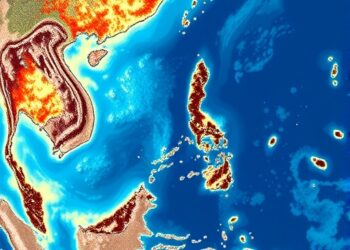New research shows how oceans can be used to help address major challenges such as the shortage of antimicrobial medicines, solutions for plastic pollution and novel enzymes for genome editing.
New research shows how oceans can be used to help address major challenges such as the shortage of antimicrobial medicines, solutions for plastic pollution and novel enzymes for genome editing.
In the past 20 years, scientists have greatly increased the number of microbial genomes they have collected from the ocean. However, using this information for biotechnology and medicine has been difficult.
For this new study, led by BGI Research in China in collaboration with the Shandong University, Xiamen University, the Ocean University of China (OUC), the University of Copenhagen (Denmark) and the University of East Anglia (UEA) in the UK, researchers analysed almost 43,200 genomes of micro-organisms (bacteria, archaea) from marine samples, uncovering a wide range of diversity with 138 distinct groups.
They provide new insights into how genome sizes evolve and, for example, how ocean microbes balance having CRISPR-Cas systems – part of their immune defense – with antibiotic resistance genes. Many of these genes are activated by antibiotics to help the microbes survive.
CRISRP-Cas systems and antibiotic resistance genes are also part of the immune system of bacteria. Using computer-based methods, the team discovered a new CRISPR-Cas9 system and 10 antimicrobial peptides, another important part of the immune system of different organisms.
Antimicrobials – including antibiotics, antivirals, antifungals and antiparasitics – are medicines used to prevent and treat infections in humans, animals and plants. However, according to the World Health Organization, growing resistance caused by overuse of certain drugs threatens the effective prevention and treatment of an increasing range of infections, so there is a need to find new types.
Publishing the results in the journal Nature, the team also found three enzymes that can break down a common plastic that pollutes the oceans, polyethylene terephthalate (PET), another major environmental and health issue.
Laboratory experiments confirmed the findings obtained by ocean metagenomics, showing their potential usefulness. Lead UK author Thomas Mock, Professor of Marine Microbiology in UEA’s School of Environmental Sciences, said the work takes the field of ocean metagenomics to the “next level”.
“This study highlights how large-scale metagenomic sequencing of ocean microbiomes can help us understand marine microbial diversity and how it evolved and find new approaches to use this knowledge in biotechnology and medicine,” said Prof Mock.
“The interaction between marine microbes and their environment is underpinning global-scale processes such as carbon fixation and nutrient recycling. Thus, these interactions contribute to the habitability on Earth because the oceans are the largest and most significant ecosystem on the planet.
“Factors such as salinity, temperature changes, light availability, and pressure differences from the surface to the sea floor and the poles to the tropics create unique selection pressures influencing the adaptation and co-evolution of oceanic microbes.
“Building on these insights, our study uses the repository of marine microbial genomes retrieved from metagenomes as a key resource for genome mining and bioprospecting. This method allows us to discover new genetic tools and bioactive compounds.”
The data covers a variety of marine environments worldwide, stretching from pole to pole and from the surface to the deepest ocean trenches. The study therefore significantly enhances knowledge of marine microbiomes with the creation of a new publicly available database, which includes around 24,200 species-level genomes.
“While previous studies have provided initial insights into the role of marine systems in maintaining biological diversity, our research not only builds on these findings but also introduces new opportunities for sustainable exploration and utilization of the oceans, which is overdue considering the global challenges the human society faces on our planet,” said Prof Mock.
“Advancing this work with deep learning-based genome mining of ocean microbiomes, combined with biochemical and biophysical laboratory experiments, shows great potential for tackling global challenges such as antimicrobial shortages and ocean pollution.
“This approach highlights the crucial role of marine microbiomes in improving human well-being and promoting environmental sustainability.”
This work is part of the strategic alliance between UEA in Norwich and OUC in Qingdao supporting integrative approaches for advancing science and technology for a sustainable ocean.
Prof Mock’s work was carried out as part of a grant from the UK’s Natural Environment Research Council (NERC) and supported by the School of Environmental Sciences.
‘Global marine microbial diversity and its potential in bioprospecting’, Jianwei Chen et al, is published in Nature on September 4.
Journal
Nature
Method of Research
Data/statistical analysis
Subject of Research
Cells
Article Title
Global marine microbial diversity and its potential in bioprospecting
Article Publication Date
4-Sep-2024




